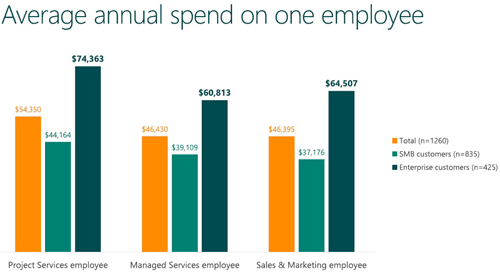Microsoft Releases Data on Project-Services Employee Premium
Attempting to quantify what it's been preaching for the last few years, Microsoft published some internal research numbers on what partners spend on managed-services employees versus project-services employees.
Project-services employees cost about 17 percent more on average than managed-services employees, according to Microsoft.
As Microsoft moves its products to the cloud, the company's channel-facing executives have been urging partners to transform their businesses from the project-services approach that has worked so well for the channel in the days of Exchange migration projects and SharePoint implementations. Now, Microsoft wants partners who offer managed services to their customers that bundle things like Office 365, Dynamics CRM Online, Azure services.
One of the arguments is that managed-services employees, with a heavier help-desk orientation, are less expensive to hire and employ than the project-services experts who can design or implement comprehensive solutions.
Microsoft released some data on pay as part of a huge recent data dump on cloud opportunities and business models. (See Barb Levisay's recent coverage here.)
The data came from 1,260 surveys in March through April of this year of English-speaking members of the Microsoft Partner Research Panel. Due to currency adjustments and wide geographic differences, the figures themselves are too broad to be too meaningful, but the percentage differences are instructive.
 [Click on image for larger view.]
[Click on image for larger view.]
According to the survey, average annual spend on one project-services employee is $54,350. That's 17 percent higher than the average annual spend of $46,430 on a managed-services employee. See the chart on this page from the Microsoft report, "Microsoft Cloud Profitability Scenarios," for more detail, such as breakdowns for partners serving SMB versus enterprise customers, and for sales and marketing employee details. The SMB customer-focused partners spending per employees is 13 percent higher for project services versus managed services, while the enterprise premium is 15 percent.
This is just one example of the reams of information Microsoft provided in the recent data dump. The whole data set is well worth checking out here and here.
Posted by Scott Bekker on August 10, 2015